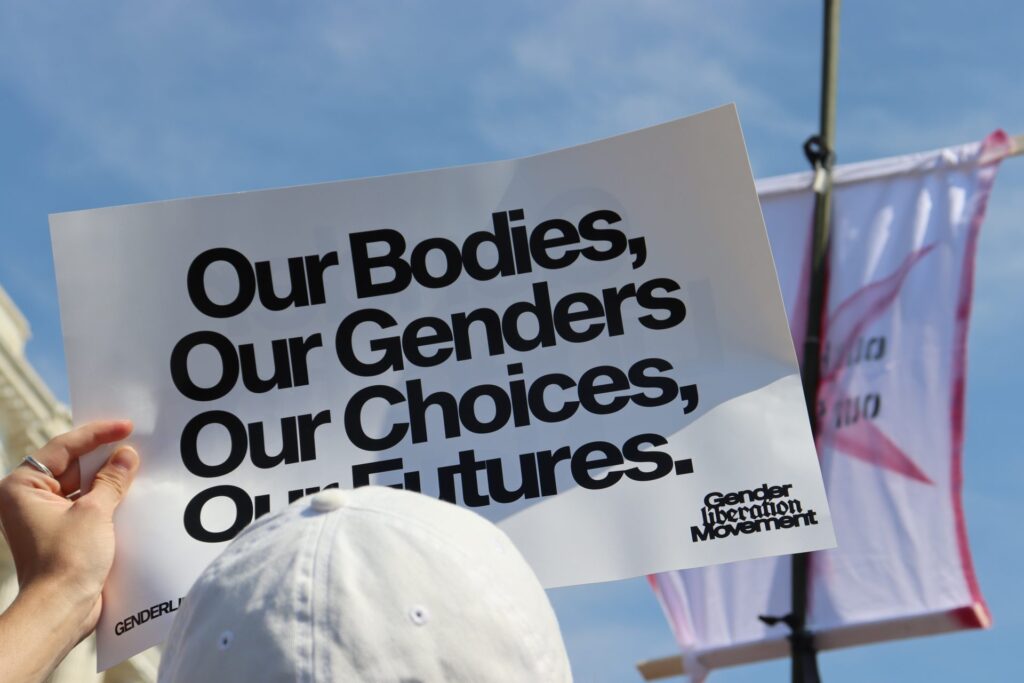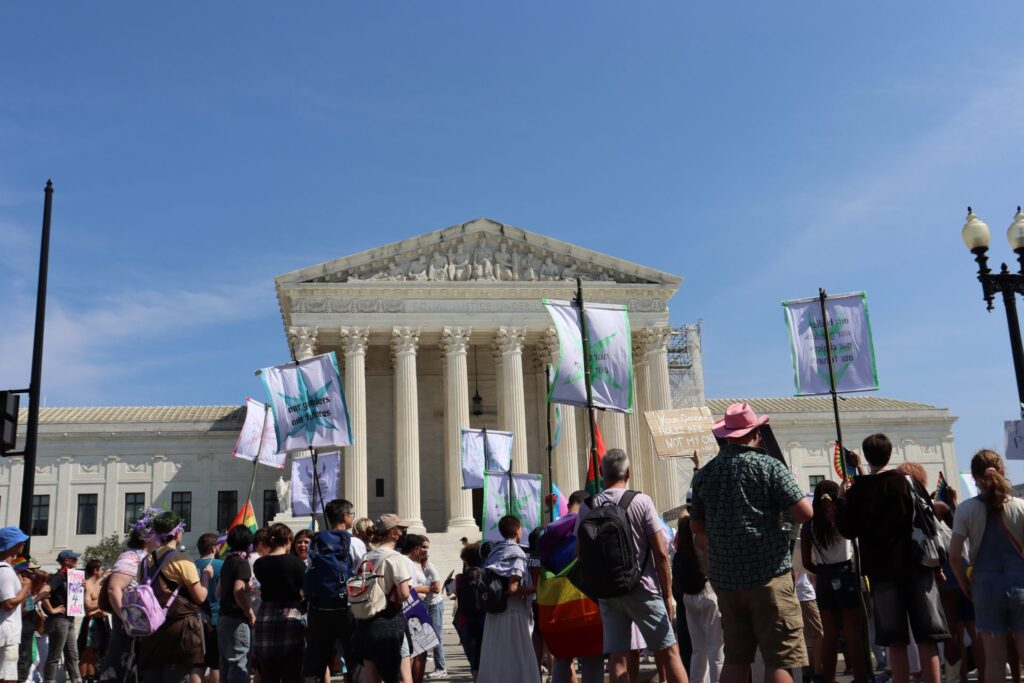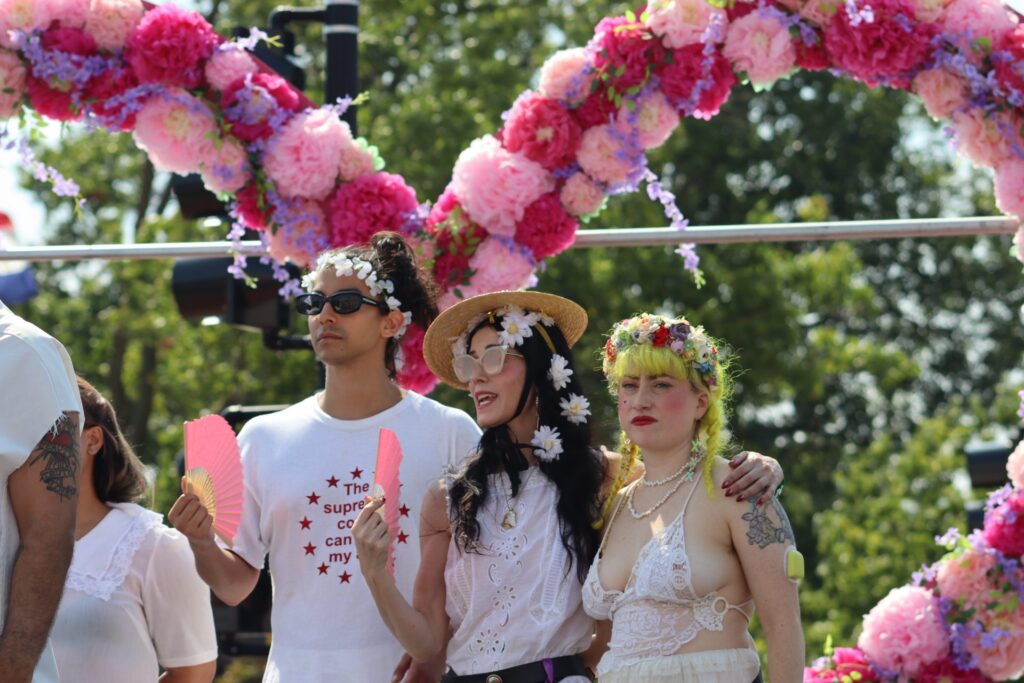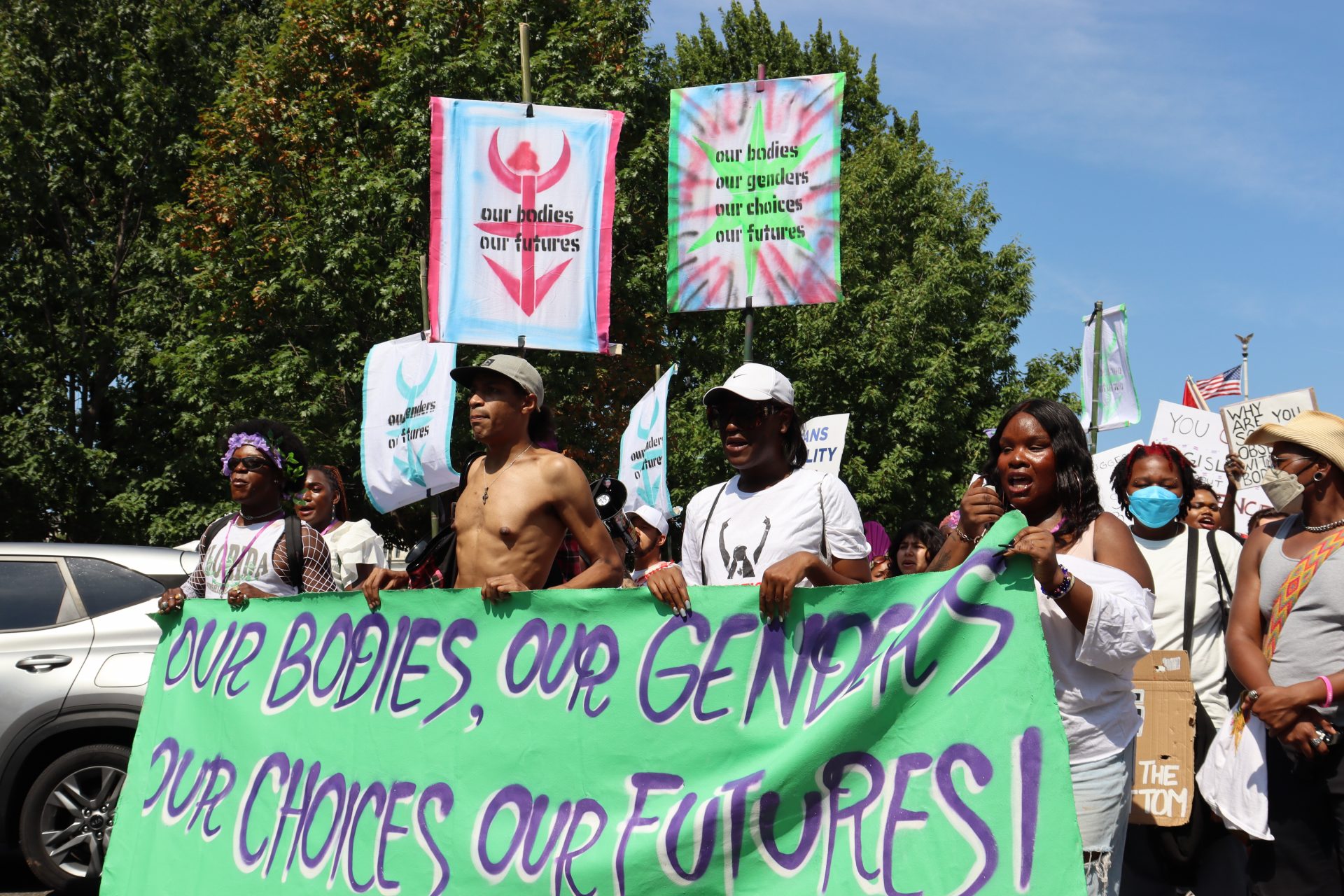Travelers at Union Station were greeted with chanting, dancing, cheering, and marching on Sept. 14 as over 500 demonstrators gathered for D.C.’s first Gender Liberation March at Columbus Circle.
The march was co-founded by writer and activist Raquel Willis and organizer Eliel Cruz to advocate for both reproductive justice and trans rights. Willis, who spoke at the beginning of the rally, emphasized the intention and message of the Gender Liberation March.
“We are so grateful to see you all out here to make it known that nobody can mess with our rights, our bodies, our genders, our freedoms, and most of all, our liberation,” Willis said.
Organizers define gender liberation on their website as “the power to defy or transcend the gendered expectations that harm and limit us.” The march aimed to create an energetic, united front supporting this vision and other progressive goals.
Lauryn Adrianna, an organizer with Harriet’s Wildest Dreams, a D.C.-based Black-led advocacy and prison abolitionist organization, spoke next, highlighting the power of solidarity.
“We’ll always be stronger together. In spaces of love, trust, and shared experience, we find the courage to be who we truly are,” Adrianna said. “Whether you’re queer, trans, non-binary, a woman of cis or trans experience, we need each other to survive the hatred, ignorance, and violence that they try to use to silence us.”
Speakers emphasized that all of the rally’s participants have a role in activism and creating change.
“Change does not come from behind the back of a podium. Change comes from the work that all of you are doing every day in your communities, whether you’re talking to your people, stuffing envelopes, marching, walking, everything,” Rachel Carmona, Executive Director of Women’s March, said. “It’s going to take every single one of us to do everything we can everywhere we are, not just in D.C., but in our communities all across the country.”
 Photo by Paige Benish
Photo by Paige Benish
Nikita Tatachar (SFS ’26) and Jackie Early (CAS ’26) both attended the march. Early, a Texan, explained that in the wake of Texas’ recent implementation of a law that bans transgender people from changing their gender marker on identification, she also felt the need to attend the rally.
“I think it personally is just to blow off some steam, because two weeks ago, the Attorney General of Texas basically stopped the ability of trans people to change their name on driver’s license birth certificates, which directly affected me,” Early said.
Tatachar said that she felt it necessary to be there given the threat of anti-trans and queer legislation.
“There’s a very pressing need to stand up for our trans and queer siblings,” Tatachar said. “We’ve seen a lot of shit in the past few years, but it feels like it’s incredibly important, even now, to stand up.”
Many speakers emphasized that all struggles for liberation—whether that means freedom from colonial occupation or freedom from binary gender roles—are connected. Schuyler Bailar, an activist and the first openly transgender swimmer in NCAA Division I, tied the march to global liberation movements. He wore a shirt that read “Trans athletes belong in sport,” as well as a keffiyeh, a traditional Palestinian scarf that has become a symbol of Palestine.
“I wore the shirt that I’m wearing and the keffiyeh together today on purpose,” Bailar said during his speech, “because our liberation is collective. Bodily autonomy, the right to self determination, the right to be ourselves and to find how we thrive—not just survive, but thrive—that right is all of ours, whether you’re in Palestine, Congo, Sudan, Ethiopia, or right here.”
In addition to speeches, some speakers also performed music for the audience. Peppermint, an activist, drag queen, and runner-up of season nine of Rupaul’s Drag Race, performed her song, “A Girl Like Me,” to the crowd’s cheers.
“A girl like me isn’t always seen as equal, and sometimes not one at all. A girl like me can’t give a man a baby. And when trouble comes, she’s first to take the fall,” she sang.
After the speeches and performances, participants marched from Columbus Circle to the Supreme Court.
 Photo by Paige Benish
Photo by Paige Benish
“Today, we march not just for ourselves, but for every person who couldn’t be here, for every person who fought before us, for every future generation that will hopefully walk in a world more free because we refuse to give up,” Adrianna said.
Demonstrators shouted chants including, “Trans rights are human rights,” “No justice, no peace,” “We have nothing to lose but our chains,” and “Free, free, free Palestine.”
Many demonstrators were wearing white, a homage to other protest movements, including the Brooklyn Liberation marches, suffragette protests, and the National Association for the Advancement of Colored People Silent Parade.
The march continued from the Supreme Court to the Heritage Foundation’s headquarters on Massachusetts Ave. The Heritage Foundation is a conservative think tank that has led the creation of Project 2025, a detailed plan outlining how the next Republican president can overhaul the executive branch and implement conservative policies.
“The Gender Liberation March and movement is the antidote to Project 2025,” Cruz said in a speech earlier at the rally. “We believe in community. We believe in showing up in solidarity for each other and in building a world that works for all of us.”
The march then returned to Columbus Circle for additional programming, including a drag queen story hour, booths for taking photos, crafting flower crowns, and more speeches.
 Photo by Paige Benish
Photo by Paige Benish
Several organizations from D.C. and beyond had booths and tables in Columbus Circle, handing out banned books, merch, and resources for demonstrators.
One of the booths belonged to Middle Church, a New York City church. Erin Lipskis, Executive Assistant at Middle Church, explained that the church made the trek out to D.C. to support Rev. Jacqui Lewis, who was speaking, and to show demonstrators that the church has a place for them, even if they’ve felt alienated in the past.
“We believe God has space at the table for everyone, especially our queer brothers and sisters, et cetera,” Lipskis said. “ We represent progressive beliefs that remind people that the church is about love and about sharing that love with everyone.”
Residents from across the D.C. area were also involved in the march. Edie Young, a senior at Jackson Reed High School in Northwest D.C., is an organizer with the Women’s March and volunteered at the rally. She emphasized the importance of getting involved with groups like Women’s March ahead of the upcoming election, where progressive policies are on the ballot.
“I want to help protect rights and help people learn about Women’s March, because our rights are being stripped, and we deserve rights,” Young said. “Registering to vote is so important so we can protect queer and trans rights, and reproductive freedom. As a queer person myself, it’s so hard to live when we don’t know if we’re going to have rights in the future.”
As the day came to an end, organizers stressed that their work did not end with the march– liberation is a daily process. Tatachar emphasized that if Georgetown students want to get involved in that process, there are many ways to engage with movements like trans rights and reproductive freedom.
“Getting involved is not that scary. It is so accessible, and we’re always welcoming new people,” Tatachar said. “Even if you don’t think that protesting is a space for you, just register to vote. You know what you got to do. Just stand up for people that you love and care about, and that’s all you can really ask for.”







